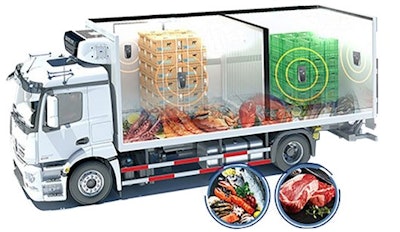
The ever-increasing population, as well as the prolonged lifespan of humankind over the years, drastically increased the demand for food and medical supplies all around the globe. This lead to the spread of storage facilities, temperature-controlled environments and cold supply chains to provide people with their daily needs.
On a consumer level, there is very little information about the challenges of supply chain management. It is a monumental task to transport food products, pharmaceuticals and other perishable goods while maintaining their integrity. Long-range transport operations have always been a logistical nightmare, but when perishable products are involved, it is even more of a challenge to deal with. However, the developments in the GPS-based technologies paved the way for advanced management systems that allow business owners and executives to monitor and manage the condition their shipments every step of the way.
The ability to monitor a vehicle’s location on-demand and check the temperature levels in real-time gives an edge to people in charge of the integrity of shipments onboard vehicles. There are a lot of things that can go wrong during a lengthy transport operation, and a simple oversight can ruin millions of pounds worth of cargo if it isn’t supervised correctly. It is easier said than done though, considering cold supply chains have thousands of trucks spread across continents to delivery temperature-sensitive cargo to their customers. Fleet management systems with the help of remote temperature monitoring are the perfect solution to all problems cold supply chains experience every day. A supply chain is only as fast and responsive as the data flow; GPS-based fleet management systems provide actionable real-time information that can prevent a simple malfunction from becoming a disastrous situation.
What is a perishable product?
First and foremost, it is essential to understand what is considered as a perishable product and why it is vital to keep in a temperature-controlled environment. Perishable goods are products that have a short lifetime; these delicate commodities can spoil, decay or become unsafe to use if not kept at the optimal temperature levels at all times. Perishable products consist of vegetables, fruits, spices, grains, dairy foods, meat and poultry, and pharmaceuticals. Their short lifespan makes it harder to move these delicate goods through the supply chain to customers before they lose their value or worse, spoil. Managing the transportation of perishable products are infinitely more complicated compared to other types of products. As an example, vaccines must have verifiable temperature data levels from the time of their manufacture up to their administration. Without this information, there is no way of telling if they have lost their effectiveness or if they are still usable on patients at all.
How does GPS help?
GPS technology isn’t just about tracking the location of vehicles and their movements. These cutting-edge systems can be enhanced with additional sensors and software upgrades to monitor the temperature levels of a cargo hold remotely and trigger an alert in case of an emergency or malfunction in the cooling systems. The collected data and important event alerts need to be delivered to the responsible parties immediately for the appropriate actions to be taken. GPS tracking systems are capable of notifying business owners and field supervisors via email, SMS or smartphone notifications almost instantly; providing them with enough time to deal with the situation at hand.
Benefits of GPS tracking systems
Temperature and humidity monitoring. With sensitive sensors for measuring ambient temperature and relative humidity levels, people in charge of the cold supply chain will have complete visibility over the condition of their shipments. The small and wireless sensors can be deployed in any environment quickly and collect data to create an accurate mapping of temperature levels throughout the journey. The temperature of a shipment is monitored and logged automatically, and this data can be viewed in real-time on any mobile device or computer in the world.
Real-time tracking. Transport and logistics operations are complicated to manage for a reason; numerous things can go wrong without any reason including vehicle breakdowns, cooling system malfunctions, accidents, cargo theft and much more. With the help of GPS, it is possible to know precisely where the vehicles are at all times as well as the condition of the cargo on board. On-demand access to real-time actionable data is one of the main reasons fleet management systems have reshaped entire business industries.
Event alerts. GPS-based based fleet management systems work in tandem with cloud-based tracking software that can be configured to report even the slightest change in temperature. Event alerts provide a steady information flow and keep the business owners and field managers updated about the condition of their shipment. Emergency alerts allow the responsible parties to handle any situation promptly. As an example, in the event of a refrigerator unit failing, the driver can be informed immediately while the road assistance teams are directed to the location of the vehicle. A timely response can be the difference between a spoiled cargo and a shipment in pristine condition.
Cold chain: The temperature-sensitive supply chain
The cold chain refers to managing the transport of temperature-sensitive products in order to maintain their quality and safety from the manufacturing process to the distribution chain until they are delivered to the customer. Most of the food we consume as well as the medical supplies we use every day arrive at our doorstep in optimal condition thanks to the technologies such as cold chain monitoring systems. Perishable products have to be kept in designated temperature levels to make sure they are safe to use, failing to keep these delicate products at the correct temperatures can result in toxic degradation, microbial growth, discoloring and an overall reduction of the shipment’s value. Not only will these products no longer be suitable for consumption, but it will also cause a crisis between the customer and cold chain companies due to the loss of value.
GPS-based fleet tracking systems are designed to help transport and logistics companies with the challenges of cold chain management by providing accurate, actionable and real-time temperature data on-demand. Remote temperature and humidity monitoring play a vital role in cold chain management. With the increasing operational costs, customer demand and resource management issues, remote temperature and humidity monitoring systems can be the key to streamline long-range transport operations and make sure the shipments arrive at their destination in perfect condition.




















